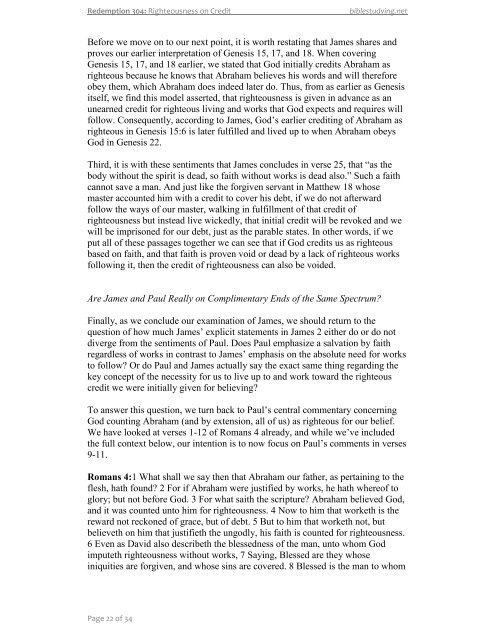righteousness-credit
righteousness-credit
righteousness-credit
You also want an ePaper? Increase the reach of your titles
YUMPU automatically turns print PDFs into web optimized ePapers that Google loves.
Redemption 304: Righteousness on Credit<br />
biblestudying.net<br />
Before we move on to our next point, it is worth restating that James shares and<br />
proves our earlier interpretation of Genesis 15, 17, and 18. When covering<br />
Genesis 15, 17, and 18 earlier, we stated that God initially <strong>credit</strong>s Abraham as<br />
righteous because he knows that Abraham believes his words and will therefore<br />
obey them, which Abraham does indeed later do. Thus, from as earlier as Genesis<br />
itself, we find this model asserted, that <strong>righteousness</strong> is given in advance as an<br />
unearned <strong>credit</strong> for righteous living and works that God expects and requires will<br />
follow. Consequently, according to James, God’s earlier <strong>credit</strong>ing of Abraham as<br />
righteous in Genesis 15:6 is later fulfilled and lived up to when Abraham obeys<br />
God in Genesis 22.<br />
Third, it is with these sentiments that James concludes in verse 25, that “as the<br />
body without the spirit is dead, so faith without works is dead also.” Such a faith<br />
cannot save a man. And just like the forgiven servant in Matthew 18 whose<br />
master accounted him with a <strong>credit</strong> to cover his debt, if we do not afterward<br />
follow the ways of our master, walking in fulfillment of that <strong>credit</strong> of<br />
<strong>righteousness</strong> but instead live wickedly, that initial <strong>credit</strong> will be revoked and we<br />
will be imprisoned for our debt, just as the parable states. In other words, if we<br />
put all of these passages together we can see that if God <strong>credit</strong>s us as righteous<br />
based on faith, and that faith is proven void or dead by a lack of righteous works<br />
following it, then the <strong>credit</strong> of <strong>righteousness</strong> can also be voided.<br />
Are James and Paul Really on Complimentary Ends of the Same Spectrum?<br />
Finally, as we conclude our examination of James, we should return to the<br />
question of how much James’ explicit statements in James 2 either do or do not<br />
diverge from the sentiments of Paul. Does Paul emphasize a salvation by faith<br />
regardless of works in contrast to James’ emphasis on the absolute need for works<br />
to follow? Or do Paul and James actually say the exact same thing regarding the<br />
key concept of the necessity for us to live up to and work toward the righteous<br />
<strong>credit</strong> we were initially given for believing?<br />
To answer this question, we turn back to Paul’s central commentary concerning<br />
God counting Abraham (and by extension, all of us) as righteous for our belief.<br />
We have looked at verses 1-12 of Romans 4 already, and while we’ve included<br />
the full context below, our intention is to now focus on Paul’s comments in verses<br />
9-11.<br />
Romans 4:1 What shall we say then that Abraham our father, as pertaining to the<br />
flesh, hath found? 2 For if Abraham were justified by works, he hath whereof to<br />
glory; but not before God. 3 For what saith the scripture? Abraham believed God,<br />
and it was counted unto him for <strong>righteousness</strong>. 4 Now to him that worketh is the<br />
reward not reckoned of grace, but of debt. 5 But to him that worketh not, but<br />
believeth on him that justifieth the ungodly, his faith is counted for <strong>righteousness</strong>.<br />
6 Even as David also describeth the blessedness of the man, unto whom God<br />
imputeth <strong>righteousness</strong> without works, 7 Saying, Blessed are they whose<br />
iniquities are forgiven, and whose sins are covered. 8 Blessed is the man to whom<br />
Page 22 of 34


